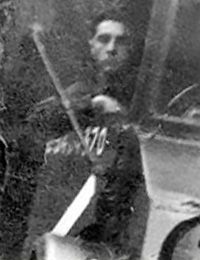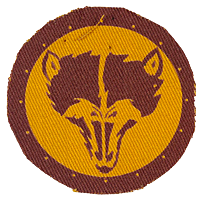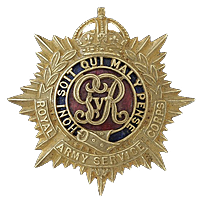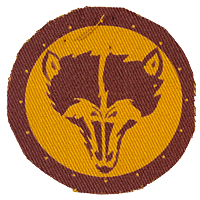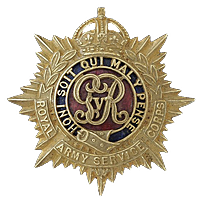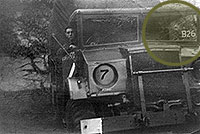We had been embarking for three days and for three days and nights we had been disembarking, but at last the powers that be decided we were to invade France. Where the landings were to be we were not told; to us this did not matter as we had been under canvas for the last four weeks and due to the lovely summer weather! We went to bed soaking wet and we got up soaking wet, it just rained and rained nonstop. We boarded our L.S.T. or Landing Ship Tank, driving our wagons on board, fully loaded with about three tons of high explosives, along with the other platoons whose lorries were laden with the same weight of petrol or 'Compo' rations. These supplies were for our "Echelon of Sherman tanks' we were part of the 8th; Armoured Brigade, The Sherwood Foresters. The 30 ton tanks were anchored to the ships deck with giant steel hawsers. Vomit bags were everywhere (they were badly needed) when we got out into the very rough seas. After about an hour we heard the most horrific sounds coming from below decks. Lo and behold one of the tanks had broken loose of its moorings; panic stations, if it wasn't restrained in some way there was the very great danger of it smashing its way out of the side of the ship.
We would all have been lost at sea, some of the senior servicemen suggested that we would forsake two of our trucks to wedge the tank by driving one wagon each side of the tank. The thing was that we could,not very well use our B Echelon trucks as these were loaded with high explosive shells, likewise we could not use C Platoon trucks either as these were loaded with Gasoline. Then came the bad news, we had no alternative but to use A platoon trucks, these were loaded with (yes you've guessed it) our rations for the next forty eight hours. Even if we were lucky enough to survive the approach to the beaches. However all went well and a catastrophe was averted. Try and get some sleep was the order, you must be joking. By this time we were within a couple of miles of the coast of France.
All hell was let loose, H.M.S. Rodney and Warspite were along with countless other naval ships were bombarding the coastline with everything they could muster, along with about three thousand other landing craft, one can imagine the pandemonium. The guns on these ships must have been absolutely red hot. All this apart from all the hundreds of landing craft which were also blazing away with anything they had in the way of armaments. Unless one was there to witness I,t no amount o f trying to visualize the scene could be imagined.
The various beaches were codenamed Gold Juno and Sword in that order, I insert this reminder here to say that all vehicles, before leaving England were what we called Waterproofed, this was a form of mastic solution that was daubed over the engine and be they tanks or self- the extended exhaust pipes, this was to enable the vehicles, propelled guns or transport of any description, to plunge into the sea from the ship, the depth of which was determined by how far the ship was able to get inshore before it was either put out of action or what underwater obstacles there were in the path of the ship. Make your way to the beach and report to the Beachmaster.
Unfortunately the enemy had decided that he was surplus to requirements and had disposed of him, consequently to this day I have still got my beach landing card. This is now amongst my souvenirs. At this point I would like to say that, although we had a material superiority over the enemy, this was of little to us as the enemy had the giant naval guns massed on the top of the cliffs, these were making everyone's life a misery as was the intention. With all these thousand of craft of all sorts in the sea, we were sitting ducks,needless to say getting on to the beaches was our main objective. The seashore was a mass of barbed wire and underwater mines. The barbed wire was wrapped around the girders that were dug into the sea bed, these in turn were fitted with mines, these mines re to be the cause of very many casualties both in men and materials. I would like to point out that at this stage of the assault that the P.B.I. or in army terms the poor bloody infantry, had to get ashore as best they could, at least we in the tanks and lorries had a little more protection.
Upon landing on the beach, our first casualty was our M.S.M. (mechanical sergeant major). He was making his way fast under the large recovery wagon to get safe shelter, unfortunately a shell splinter took his spine out from top to bottom. So much for a safe place. Owing to the amount of muck that was flying about, in the way of shells and machine gun fire, not to mention the mortar's that the enemy seemed to have thousands of, all seemingly aimed at each one of us individually, we decided that discretion was the better part of valour, we all dived under our vehicles. It was an unwritten law that if you sheltered under your tank or wagon, if you got a direct hit on your vehicle that you would survive to a good extent, because the blast always went upwards. Push on regardless, the way off the beaches had been cleared of mines to a great degree by the sappers (poor sods), the cleared way was marked by white tape either side of the route, just about six foot wide, barely wide to get through, but somehow we survived.
We were lucky enough to get off the beaches and into a vacant field, vehicles and tanks were dispersed around the perimeter of the field to try to escape any Jerry planes that may be in the air at the time. Next priority was to dig your slit trench so that at least you could get your head down below the horizon. A funny thing about a soldier in the field was that he quickly got down to digging, but rarely made the trench deep enough to get down into with any degree of protection, we always said that the British should have worn his steel helmet on his rear end, as this was always exposed to all and sundry. But at least you were not such a sitting duck.
The motto of the British army was (when in doubt) Brew up! I would point out at this stage that a brew up also applied to a tank that had been hit in the turret by an armour piercing shell was nearly always a brew up, this in effect meant that the tank and its crew were also incinerated inside, not many tank's could live to say that they had got out of a 'brew up'. To get to the other brew up, was to find an empty petrol can, cut this in half and with the top half fill with earth or sand, next step was to get a can of petrol and pour the petrol on the earth and or sand, next step was to get the other half of the can and fill it with water, place on top of the petrol fire and bring it to the boil, this was to get rid of the smell and vapour of the petrol Continue with this operation until you were satisfied that you had eliminated the odour of the petrol, after this one could then refill the can with fresh water and then when it was again boiling, you simply put into the water about three blocks of tea compound, 'Hey Presto' hopefully a fairly good 'cuppa'. It must also be pointed out at this point that if the British Army had not had the means of making a 'cuppa' then the war would have come to a complete halt.
We then had instructions to move to 'echelon' the tanks would then proceed to penetrate inland as far and as fast as they could. I would also like to point out at this point that the ft dual purpose gun in so far that it was an anti- aircraft gun as well as a field gun. Streets were contested over as though it was the final battle. In the end the British and the Canadians finally managed to get Jerry on the run, and keep after him, not allowing them time to dig in and make another stand. After a few skirmishes, if you could call them that, the great push through the Bocage country was to proceed with all haste, through France to the liberation of Brussells. After the liberation of Brussels the powers that be decided that we were entitled to a little rest. As it was now September we also thought that a rest was overdue. We had been on the go nonstop since D-Day and were on the verge of exhaustion.
Heavy losses in both men and material had played their part in in the undermining of our moral. Brussels with its life was better than anything that the doctors could prescribe, bliss for a few days (a week) if my memory serves me right. I would like to add a little; snippet into my story at this moment, in the Bocage country. One evening we had lagered up our tanks and wagons. All were freshly loaded up with the appropriate ammunition, petrol and rations (which we had to collect from C.R.A.S.C (supply centre).
My mate and I George and I decided that we would (before bedding down for the night) other words for digging a fox hole in the ground under your tank or wagon, we decided that we would try and get a beer at the local cafe or whatever, so we set out to find one. If one was left standing luck was with us, we found a little kind of cafe, this was in the parlour of a little cottage, we finished up slightly the worse for wear after drinking three bottles of vin rouge, or Plonk as we were to name it, next to arsenic it was quite palatable. When we arrived back to our field , there was chaos as Jerry had perhaps seen our chaps fires, anyway he thought he would have a bit of target practice and decided he would blow up a few tanks or wagons, one of which was mine and the the others were of the ration platoon, a few tanks were also lost.
Fortunately casualties were very light, for reasons unknown. Just how lucky can you get, upon reflection our trip to the cafe had saved our lives to fight another day. Escape number one. On the move again, it was nearing the time that the battle for Caen was about to take place. The Brit,s on the right flank of the Canad's (Canadians) on the left flank, I must add at this point that the German's had decided that they were not going to give up Caen without a 'Bloody' battle, we had liberated Bayeux without too many casualties.
I suppose that the German high command had decided that they must make a stand. In the end we finished up getting to send 500 R.A.F. Lancaster bombers to flatten the town, which they did with great precision bombing. The only trouble was that Jerry had gotten wind of what was probably going to happen and they decided that they would retire for a little while, at least until the bombing had finished, when they decided to take up their defensive positions again. In the event it finished up with the P.B.L. or the poor bloody infantry having to fight for every house and street that was left standing. It turned out to be one of the bloodiest battles of the Normandy campaign,as it incurred house to house fighting, which also proved very costly in both men and materials on both sides. In the end our superior infantry, along with good backing up from the support groups won the day. One point in issue is, that in the 50th Anniversary year of the battle for Caen, a medal was issued by the then Mayor of Caen, a Monsieur Jean Marie Girault, to the veterans who were involved in the battle. I have this medallion framed to this day. Just 58 years later. Forward to the Bocage country where the pastoral scene was to turn into another blood bath, this time mainly for the German army. This was to become known as the Falaise gap.
This incurred the pincer movement of the Brits, Canads, Yanks and the Polish, the plan was to trap a good part of the German army in the Falaise 'pocket' by a pincer movement to close the door as it were on the retreat of the Germans from the Villers Bocage area. Hopefully to stop them fighting another day. In the event the massacre that took place was totally indescribable, suffice to say that anyone that took part in the Falaise battle will never and can never forget it. It is indelibly etched into our memories and can never be erased. History might one day publish the full story and horror of it. The ending of the battle for Falaise was also the end of the battle of Normandy. This was from the 6th of June until the 20th of August 1944. In the region of Falaise is a memorial to all those took part in the battle. There is also a very large museum Allied Forces had the upper hand as regards superiority of equipment, this was most reassuring as the good old R.A.F. was master of the skies, as most people will realize that the first task of the enemy was to stop the supplies getting through. We and all other transport units in the campaign were the chief target of the famous German 88mm guns, these were.
Thomas Henry Goddard
